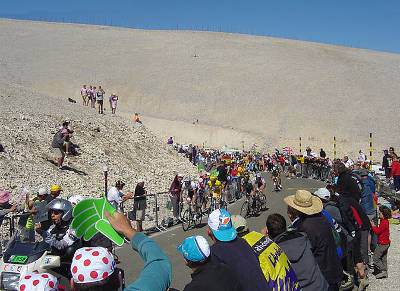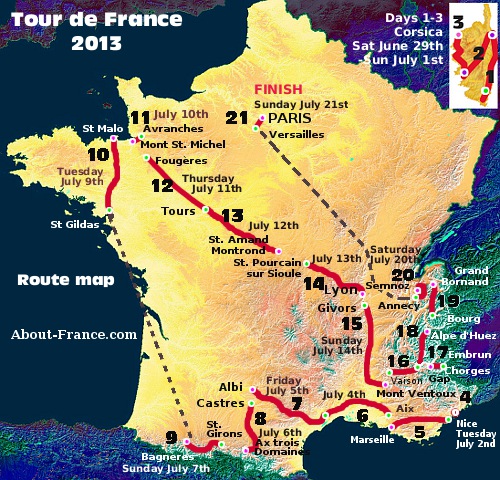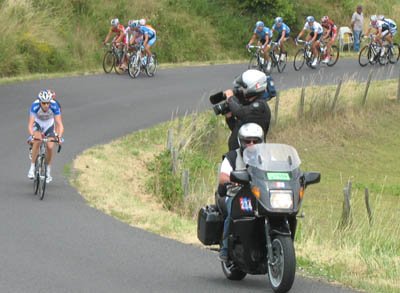Looking
ahead - the Tour
de France UK
- 2014
The 101st edition of the Tour de France will start in the UK.
Starting from the city of Leeds,
Riders will enjoy two days of cycling through the spectacular secenry
of the Yorkshire dales,
before a thir'd day's riding on the flatter land of the southeast,
between Cambridge
and London.
More
details below
2013 Tour de France final
result
For the
second year running, a
British cyclist has won the Tour de France. After Bradley Wiggins
became the first British cyclist to win the world's greatest cycle
race, in 2012, Christopher Froome has made it two in a row in
2013.
Final general classification - first ten places:
1. Chris FROOME (Great Britain)
2.
Nairo Quintana Rojas (Columbia)
3.
Joaquin Rodriguez Oliver (Spain)
4.
Alberto Contador (Spain)
5. Roman Kreuziger (Czech republic)
6. Bauke Mollema (Netherlands)
7. Jakob Vuglsang (Denmark)
8. Alejandro Valverde (Spain)
9. Daniel Navarro (Spain)
10. Andrew Talanski (USA)

Cycling
is a great tradition in France - specially
when it comes to
"le Tour".
Each
year, hundreds of thousands of locals and holidaymakers turn up in
spots all round France to watch not just the cyclists, but also the
great "caravan" of floats, cars, media and officals go by...
Following recent revelations over Lance Armstrong, organisers are
hoping that with the hundredth edition of the Tour de France,
cycling can at last come clean and put stories of drugs, doping and
steroids firmly into the past.
The
2013 edition of the Tour de France, the 100th, provided all
the excitement and fun of previous events - and apparently without any
of
the controversies that have surrounded the race in recent years.
Le
Tour
2013
the route
 Tour
de France route map by About-France.com .
Copying
permitted only by permission. Tour
de France route map by About-France.com .
Copying
permitted only by permission.
The
route
of the 2013 Tour de France
The hundredth edition of the Tour de Franceis taking
place totally within France, breaking with the tradition of the
past few years which have included a leg or two in neighbouring
countries.
The tour started, for the first time in the Tour's
history, on the island of Corsica; riders spent three days,
from 1st to 3rd July,
on the beautiful Mediterranean island, before crossing over to the
mainland.
After that it crossed to the mainland, and 4th
July saw team time trials around the city of Nice, on the French
Riviera.
From then the Tour headed across the Mediterranean
regions of France from the Riviera to the Pyrenees, before jumping to
the the west coast, in the Vend�e area. From here the Tour
crosses to the northern coast of Britanny, at Saint Malo.
From St Malo, riders then made a long
diagonal journey from northwest France back to southeast France, via
Tours, Saint Amand Montrond (known as the geographic centre of France)
and Lyon.
The final week will see riders battling it out
against each other in the hills and mountains to the east of the Rhone,
with several Alpine passes and summits to negotiate.
Click for Cycling in
France
A guide to cycling in France: rules, long-distance cycle routes,
essential cycling vocabulary, and more
After that, riders will return by TGV
to the Paris region, for an emblematic final stage between two of
France's most well-known sites, the chateau of Versailles and the
traditional finish on the Champs Elysées in Paris - only to
mark
the 100th anniversary, the finish will be a bit less traditional, with
an evening finish at 9.30 p.m. up the Champs Elysées to a
floodlit Arc de Triomphe.
The race can be watched anywhere along
the route:
near the start of the day's leg, riders tend to be very bunched, and
the actual race passes in about a minute. Towards the end of a leg,
riders are more spaced out, so the thrill of the race lasts longer.
However most of the spectacle comes not from the riders themselves, but
from the "caravan", an hour-or-more long procession of cars, floats and
motorcycles from the Tour's sponsors and the teams. It's all very
commercial, with freebies being thrown out to the spectators; cheap
baseball caps, little packs of sweets, mini-pretzels, keyrings and
other gimmicks. It's interesting to watch, and the kids love it. But if
its the actual race you want to see, then it's far better to watch it
on TV where the cameras follow the riders from start to finish.
Cycling is not just the Tour de France, but is a popular leisure
activity. Click for more information on cycling
in France and France's network of cycleways.
The 2013 Tour de France route
stage by stage
| Stage |
Date |
Day’s
route
(towns, regions) and terrain |
Length
in Km. |
| 1st
Stage |
Sat 29th June |
Corsica:
Porto-Vecchio - Bastia
- relatively flat coastal plain |
200
km |
| 2nd Stage |
Sun 30th June |
Corsica:
Bastia - Ajaccio - across the mountains of central Corsica
|
155 km
|
| 3rd Stage |
Mon 1 July |
Corsica:
Ajaccio - Calvi - hilly terrain along Corsica's rocky northwest coast |
145
km |
| 4th Stage |
Tues 2
July |
Nice - Nice -
time trials (French Riviera) |
25
km |
| 5th Stage |
Wed 3 July |
Cagnes sur Mer
- Marseille (Provence-Alpes-C�te d'Azur region) - hills and
valleys |
219
km |
| 6th Stage |
Thur 4
July |
Aix en
Provence - Montpellier (Languedoc-Roussillon)
- flat with some hills |
176
km |
| 7th Stage |
Fri 5 July |
Montpellier (Languedoc-Roussillon)
to Albi (Midi-Pyrénées)
|
205
km |
| 8th Stage |
Sat 6 July |
Castres -
Ax-trois-Domaines (Midi-Pyrénées) |
194
km |
| 9th Stage |
Sun 7 July |
Saint-Girons -
Bagnères-de-Bigorre. (Midi-Pyrénées) Pyrenean
mountain stage |
165
km |
| Rest
day |
Mon
8 July |
Saint
Nazaire |
none |
| 10th
Stage
|
Tue
9 July |
Saint-Gildas-des-Bois
(Pays de la Loire)
- Saint-Malo (Brittany)
|
193
km
|
|
11th Stage
|
Wed 10
July |
Avranches -
Mont St Michel, (Normandy)
individual time trial, 33km |
33 km |
| 12th Stage |
Thur 11
July |
Fougères
(Brittany)
- Tours (R�gion
Centre)
|
218
km |
| 13th
Stage |
Fri 12
July |
Tours - Saint
Amand Montrond (R�gion
Centre) A generally flat leg, terminating in the
town known as the centre of France. |
173
km |
| 14th
Stage |
Sat
13 July |
Saint-Pour�ain-sur-Sioule
(Auvergne) - Lyon (Rhône-Alpes)
Hilly stage across the Forez mountains - |
191
km |
| 15th Stage |
Sun
14
July |
Givors (Rhône-Alpes)
- Mont-Ventoux - finishing with one of the classic climbs of the Tour
de France. |
242
km |
|
Rest day |
Mon
15
July |
Rest
day |
none |
| 16th
Stage |
Tues
16 July |
Vaison-la-Romaine
- Gap Hilly stage in the foothills of the Provence Alps and
Luberon |
168
km |
|
17th
Stage
|
Wed
17 July |
Embrun
- Chorges - Time trials |
32
km |
| 18th
Stage |
Thur
18 July |
Gap
- Alpe d'Huez - Mountainous. Summit finish in the
Alps |
168
km |
| 19th Stage |
Fri 19
July |
Bourg d'Oisans
- Le Grand Bornand - another Alpine stage |
204
km |
| 20th Stage |
Sat 20
July |
Annecy - Mont
Semnoz (Rhône-Alpes)
- mountainous course in the foothills of the Alps, with a
summit finish. |
125
km |
|
Sun 21
July |
Versailles–
Paris
(Ile de France) - Evening finish on the
Champs Elysées |
|
Total length: 3360 km
For
the record: route of
the The Tour de France 2008 : Tour de France 2009
Tour
de France 2010 : Tour de France 2011
Tour de
France 2012
 With
almost 200 cyclists, including many of the world's best, the Tour de
France - which first took place in 1903 - is certainly a great sporting
event; nonetheless, it is an event that has been marred - even heavily
marred - in recent years by doping scandals, with cyclists proving
positive in anti-doping tests. The 2008 race was no different from
others, and at a small number of competitors were withdrawn from the
race following a positive doping test.
Yet in spite of the doping scandals, and the withdrawal in
recent
years of certain major teams, the "Tour" goes on, and it is difficult
to imagine how it could not. This mega sporting event is worth millions
of Euros in advertising, sponsorship and worldwide television rights,
attracts millions of spectators, and is one of Europe's great media
circus acts.
For the hundreds of thousands who turn up
to line the route, the cycling is actually only a tiny bit of the show:
While the time-trial races may offer a more long-drawn-out cycling
experience for spectators, with competitors taking part one by one, on
normal race days the riders may go past in just a minute, especially in
the earlier part of a day's leg, before the participants have become
more spaced out. But then, the actual race is just a small part of the
show. Starting some two hours before the race, the "Caravan" is a
cavalcade of floats, decorated cars and other vehicles that moves along
the route, throwing out goodies and free samples to the spectators; it
is a massive advertising stunt. The advertising caravan, made up of the
Tour's official sponsors, is followed by a long line of official cars,
technical vehicles, media and motorbikes, lights flashing, horns
sounding, all warming up the spectators for the actual event itself.
Then, at last, the riders come by - and are gone again as quickly as
they appeared, pounding uphill or downhill at speeds that can reach 50
mph or more. A bit of an anti-climax.... And with that, the day's
excitement is over.
Anyone wanting to watch the race
in a serious manner would be well advised to do so on television; but
for a day's outing, with all the fun of the crowds, the waiting, the
caravan, and the atmosphere, watching the Tour go by is as good as many
other events, and what's more it's free.
The Tour can
be watched all over France, and each year the route is different,
taking in at least one leg in another country.
If you go to watch the Tour, specially with kids,
take
care! Don't let children stand too close to the road, and never cross
the road while the caravan is passing.
Tourists wanting to book holiday
accommodation along the route are advised to do so early.
Click here for holiday cottages or
for bed and
breakfast accommodation in France.
Visit the Official
site of the tour de France
Tourist attractions in
France, by region :
France in general:
The main historic monuments
and tourist attractions in France
Follow these links for a more detailed list of major tourist
attractions in the following regions:
Paris tourist attractions
Things
to see and do in Languedoc-Roussillon
Tourist
attractions in Limousin
Tourist
sites in the
Midi-Pyrenees region
Tourist attractions in
Normandy
Tourist sites in the Pays
de la Loire
A brief introduction to the regions of France
|
Accommodation for the Tour
de France
All hotel rooms
in and around the start and finish points get booked up very fast by
the teams and the media.
To avoid disappointment, check out available hotel rooms as soon as
possible, using the major online portals booking.com
or Hotels.com,
***

|
Copyright
� About-France.com 2009-2013
|



 Tour
de France route map by About-France.com .
Tour
de France route map by About-France.com .



 With
almost 200 cyclists, including many of the world's best, the Tour de
France - which first took place in 1903 - is certainly a great sporting
event; nonetheless, it is an event that has been marred - even heavily
marred - in recent years by doping scandals, with cyclists proving
positive in anti-doping tests. The 2008 race was no different from
others, and at a small number of competitors were withdrawn from the
race following a positive doping test.
With
almost 200 cyclists, including many of the world's best, the Tour de
France - which first took place in 1903 - is certainly a great sporting
event; nonetheless, it is an event that has been marred - even heavily
marred - in recent years by doping scandals, with cyclists proving
positive in anti-doping tests. The 2008 race was no different from
others, and at a small number of competitors were withdrawn from the
race following a positive doping test.